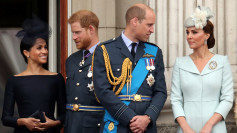Medical luminaries have estimated that the time frame for a novel coronavirus drug is still likely to be made by end of 2020, given the situation and difficulties faced by medicine and science.
Former commissioner Scott Gottlieb of the Food and Drug Administration disclosed on CBS '"Face the Nation" Sunday that many uncertainties face the prospect of shifting a drug from a host of effective testing to large-scale production, pointing his experience with the challenge of scaling a Covid-19 vaccine for the 2009 H1N1 crisis.
A year-end coronavirus shot is possible but not something that people must bet on, a health expert cautioned Sunday as US President Donald Trump and his advisers continued to press the country's reopening in an effort to boost the ravaged U.S. economy.
Aides to the president have promoted vaccine prospects, but they have also sought to de-couple meaningful work towards an immunization program from the desire to return to workplaces, classrooms and public activity, as many states are now trying to do.
With over a hundred Covid-19 drug candidates being made, things seem to have a glimmer of hope - and the common thought process, frequently reaffirmed by officials at the White House, is that this medical relief will arrive within 12 to 18 months. US Defense Secretary Mark Esper vowed that by the end of this year, they will produce a vaccine on a scale to treat Americans and their allies abroad.
Yet some authorities warn even 12 to 18 months may be too good a timetable for any vaccine to roll out of labs: the last time a drug was made took four years, and the accepted norm from among the medical ranks is that development is gauged in years -- not months.
Chinese health experts stressed that an effective drug that will have the capability to suppress Covid-19 can be given to humans as early as March next year, and the challenges of study and research all the way to development are beyond our perception.
As Chinese doctors and scientists labor painstakingly to fast-track drug development, some US lawmakers are destabilizing scientific collaboration by throwing around irresponsible words, pointing fingers, and making China look bad, health experts warned, noting that political comments from the Trump administration like severing ties may also threaten progress of research and development of the drug.
Meanwhile, British Prime Minister Boris Johnson said there could never be a drug for COVID-19 despite the massive efforts by scientists from around the world to come up with one, as the British government provides 93 million pounds ($110 million) in financial support to hasten the launch of the new Vaccine Manufacturing and Innovation Centre, despite the bleak forecast to solve the world's misery.






